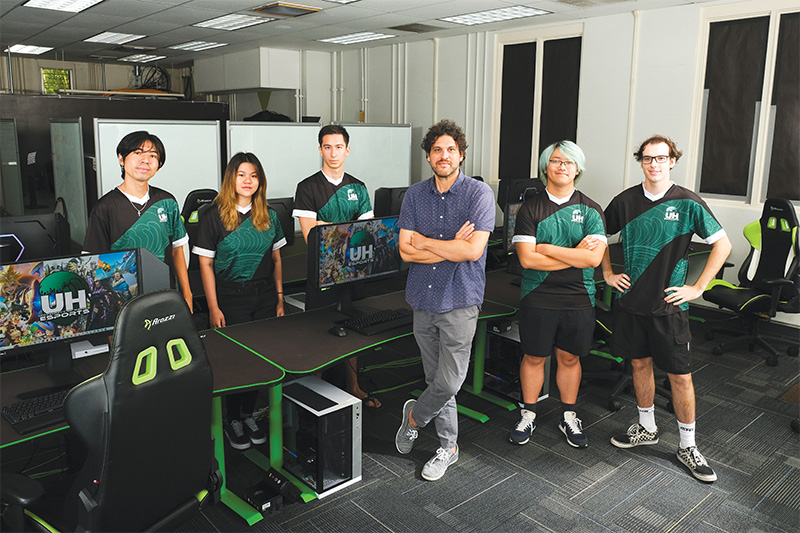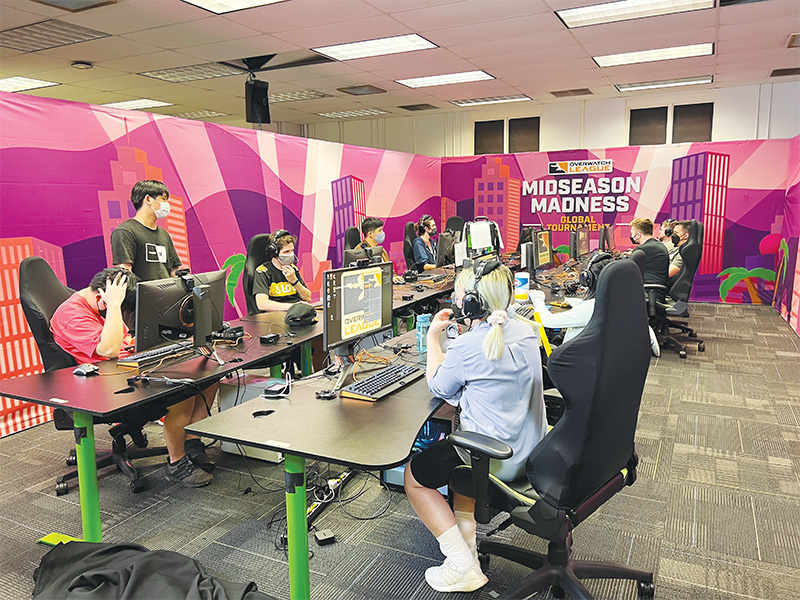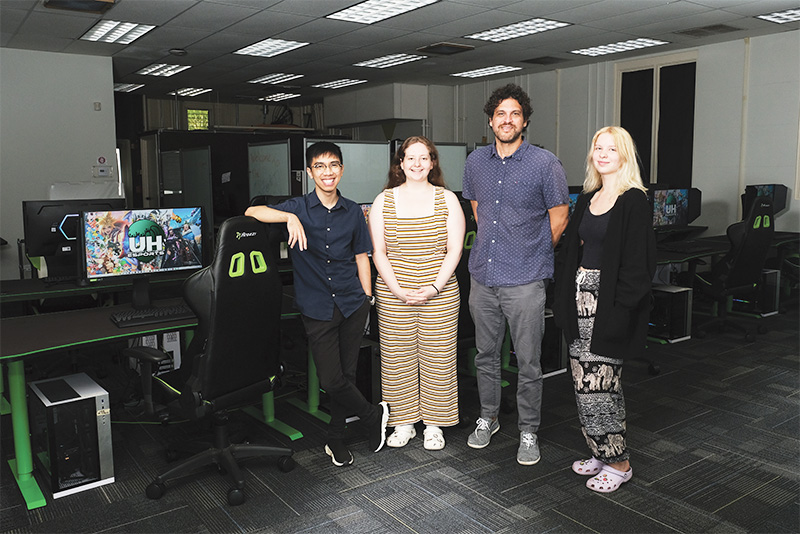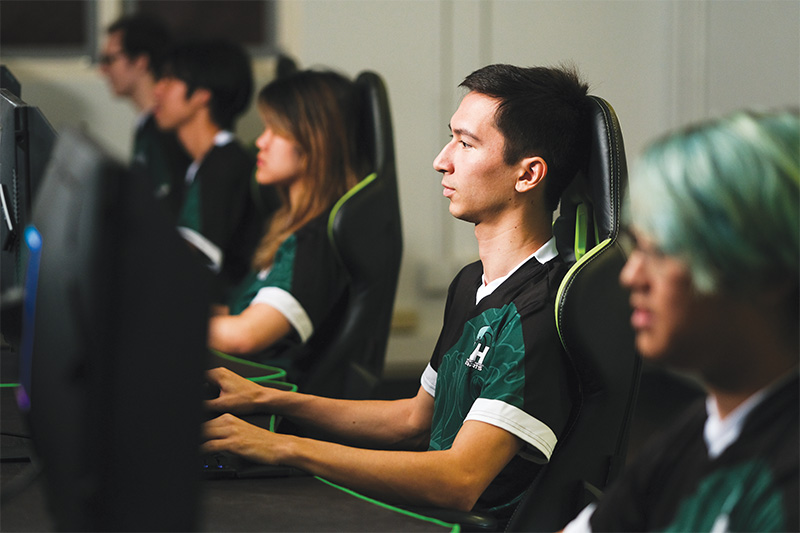Game On

Sky Kauweloa gathers with his UH Esports varsity team members, from left, Dylan Kira, Tracy Lee, Kylin Daniel, Gabriel Harp and Zach Trebbien. PHOTO BY ANTHONY CONSILLIO
Sky Kauweloa and University of Hawai‘i Esports are leveling up — and industry leaders are taking notice.
At its most basic, esports are video games played competitively in front of spectators. Thirty years ago, that could have meant a gathering of friends at an arcade. Now it entails all the spectacle of a major sporting event — arenas, live music, laser lights and thousands of cheering fans. Today’s pro gamers play on stage for million-dollar prizes as towering LED screens broadcast their moves to the crowd.
These tournaments are streamed on YouTube and Twitch. Shoutcasters (the esports equivalent of sportscasters) deliver play-by-plays for millions of fans tuning in from around the world.

UH Esports students help Overwatch League officials prep computers ahead of the league’s Midseason Madness tournament earlier this year. PHOTO COURTESY UH ESPORTS
“Esports has transitioned into a media industry,” says Sky Kauweloa, director of the University of Hawai‘i Esports program. “The gaming industry is huge, bigger than the movie (and) music industries combined. Many people don’t realize that. It’s a $200 billion industry globally. (Esports) is much smaller than $200 billion but it’s something that drives the video game industry heavily.”
That’s a lot for some folks to wrap their minds around.
“Esports sits in this kind of bizarre realm of tremendous popularity but unbelievability,” he says. “Like, what is this? How can this be popular? The kids who are involved in this are committed, but for the (general) audience it still remains a bizarre thing.”

The movers and shakers of the University of Hawai‘i Esports program include (from left) Kevin Nguyen, program assistant; Alie Wolpo, arena operations manager; Sky Kauweloa, director; and Madeline Gilbert, player support coordinator.
Serious Contender
It’s Kauweloa’s job to get the broader public to take it seriously. Under his guidance UH Esports has gone from a fledgling club to a major contender in the college esports space — in just four years. It boasts an internationally ranked team and hosted tournaments for a professional esports league.
But before all that happened, Kauweloa had to take gaming seriously himself.
As a kid growing up in Hawai‘i and California in the ’90s, video games were a fun pastime he took for granted. Then, in the early 2000s, he moved to South Korea to teach English.

Kylin Daniel and others focus their attention on a game of League of Legends in the UH iLab. ANTHONY CONSILLIO PHOTOS
“When I came to South Korea, I turned on the TV and saw a StarCraft match,” he says. “The match was in an arena and the players wore uniforms. There was cheering, the fans had thundersticks. That was surprising.”
Still, he was seeing a lot of new and surprising things in the country that would bring the world Gangnam Style and BTS, so he didn’t think too much about it.
It wasn’t until years later, when he was back in the U.S. pursuing a Ph.D. at UH, that he began to take a closer look at the industry — and decided to make it the focus of his research.
“For me it was not enough to just read it. I had to take part in it,” he says. “I wanted to create (an esports program) because I saw other schools had something like that and I thought, why not here? Why not UH?”
The response so far, he says, has been amazing.
UH’s Valorant team is now ranked No. 4 among colleges and universities nationwide, having beat University of Arizona and Texas A&M last year to capture the Valorant Fall Brawl title. This year, it beat seven universities in the Asia-Pacific region to win the Association of Pacific Rim Universities’ Rampage Invitational Tournament — clinching an international title. Valorant is one of the most popular multi-player first-person shooter games on the market.
Those wins were milestones for the program, but an even bigger opportunity arose.
Overwatch Opportunity
Blizzard Entertainment, one of the world’s largest video game companies, wanted to hold its Overwatch finals at UH-Mānoa.
“We hosted Overwatch finals here five times last year,” Kauweloa says. “They came here five times. They brought professional teams from North America.”
Even for Kauweloa, a big believer in UH Esports, this boggled the mind.
“For us to be selected by this major gaming publisher to hold competitions was unreal,” he says.
It was the esports equivalent of NFL or NBA teams playing season games in Hawai‘i, albeit without a stadium and crowds due to the pandemic.
Like Valorant, Overwatch is a wildly popular multi-player first-person shooter game. Because of COVID-19, the Overwatch League — the game’s professional players’ league, also known as OWL — needed to virtually connect its East leagues (in China and South Korea) with its West leagues (in North America) for competitions.
The problem was getting good ping — that’s industry slang for network latency, or the time it takes to transmit electronic data from a computer to an Internet server and back. Generally, the closer the computer to the server, the better the ping.
The Overwatch game server was in Japan, which is closer to South Korea and China than North America. That meant the East teams would have a faster connection and an unfair advantage. To even the playing field, OWL officials had to get the North Americans closer to Asia — without traveling internationally.
They landed on Hawai‘i as the perfect middle ground and reached an agreement with UH.
Still, Kauweloa worried something would go wrong. What if the ping wasn’t good enough after all? Would the pros blame UH? Those fears weren’t alleviated when the teams from the East won the first few games. “But then we started winning games here,” he says. “That was a relief. That showed we could hold our own. We were expecting the worst, but I think Overwatch had one of its best seasons last year because of us.”
Twenty UH students volunteered as interns, helping OWL run a global operation connecting players in Hawai‘i and Asia with shoutcasters in California to deliver entertainment to viewers around the world.
In addition to the invaluable experience, they also got college credits and shout-outs on OWL’s social media channels.
OWL returned to UH for its 2022 season finals earlier this year, and one of its North American teams, the LA Gladiators, won the league’s Midseason Madness tournament from UH.
Ahead Of The Game
It remains to be seen how the UH-OWL relationship evolves post-pandemic. With travel restrictions lifted, the league could return to the big arenas in Asia and North America.
But for Kauweloa and UH Esports, the momentum continues.
In September, they scored a visit from the head of Google’s Gaming and Strategy Initiatives. Moonlit Beshimov held an informal talk to highlight the potential of esports beyond competition.
“Most people think of gaming as not something you do for a living (but) it’s a leading industry for technology,” she told UH officials at the time. “It’s a huge market with a lot of innovation coming out of it. That angle is incredible besides the actual achievement of being a ranked esports team in the nation.”
That’s the direction Kauweloa sees for UH Esports, too.
“The next step is to create more public-private partnerships with industry,” he says. “My goal is to make sure students are interfacing with industry and able to get jobs. Students have a deep desire to be in this industry and I think we need to figure out ways to make that happen.
“Honestly, I believe this is the future of UH,” he adds. “(People) will have to take seriously the gaming industry. We’ve already made huge strides in doing this. We’re actually out in the front among universities that do this.”
EXTRA POINTS
Kauweloa and UH are up for Esports Awards. The prestigious prizes — think Grammys for gamers — recognize the industry’s best. Kauweloa is nominated for Esports College Ambassador of the Year and UH has a chance to unseat Maryville University as Esports Collegiate Program of the Year.
This is a rematch for Kauweloa and UH, as they’d been nominated last year, but fell just short of bringing home the titles.
Voting is open to the public through Nov. 30 at esportsawards.com/vote.
The awards ceremony takes place Dec. 13 at Resorts World Las Vegas.






